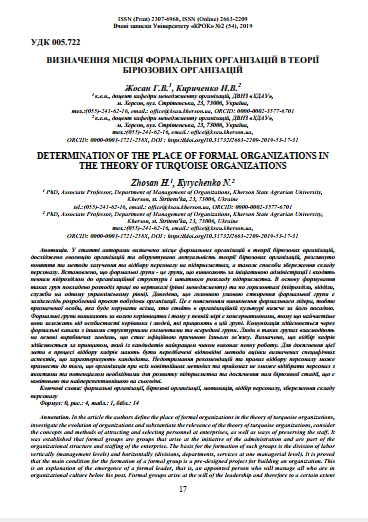DETERMINATION OF THE PLACE OF FORMAL ORGANIZATIONS IN THE THEORY OF TURQUOISE ORGANIZATIONS
DOI:
https://doi.org/10.31732/2663-2209-2019-53-17-31Keywords:
formal organizations, turquoise organizations, motivation, personnel selection, personnel storageAbstract
In the article the authors define the place of formal organizations in the theory of turquoise organizations, investigate the evolution of organizations and substantiate the relevance of the theory of turquoise organizations, consider the concepts and methods of attracting and selecting personnel at enterprises, as well as ways of preserving the staff. It was established that formal groups are groups that arise at the initiative of the administration and are part of the organizational structure and staffing of the enterprise. The basis for the formation of such groups is the division of labor vertically (management levels) and horizontally (divisions, departments, services at one managerial level). It is proved that the main condition for the formation of a formal group is a pre-designed project for building an organization. This is an explanation of the emergence of a formal leader, that is, an appointed person who will manage all who are in organizational culture below his post. Formal groups arise at the will of the leadership and therefore to a certain extent are conservative, because most often they depend on the personality of the leader and the people who work in this group. Communication is carried out through formal channels with other structural elements and within the group. People in such groups interact on the basis of production tasks, which becomes the official cause of their connection. It is determined that selection of personnel is carried out on the basis of which of the candidates will perform the certain work in the best way. In order to achieve this goal, appropriate methods of assessing specific specific aspects characterizing the candidate should be provided in the recruitment process. Failure to comply with the recommendations and rules of recruitment may lead to the organization, with all the latest methods and techniques, not be able to select the personnel with the qualities and potential necessary for the development of the enterprise and achieve a turquoise stage that is the newest and most promising today.
Downloads
References
Токарев В. Гипотеза о новой парадигме управления. Проблемы теории и практики. 2001. № 3. URL : http://vasilievaa.narod.ru/8_3_01.htm.
Шекова Е. Краткая история эволюции менеджмента. Центр дистанционного образования Єлитариум – 2011. URL : http://www.elitarium.ru/istorija_evoljucii_menedzhmenta/.
Клок К. Конец менеджмента и становление организационной демократии. СПб : Питер, 2004. 368 с.
Винокуров В. А. Качество менеджмента – основа современной управленческой парадигмы. Менеджмент в России и за рубежом. 2006. № 6. – С. 11–19.
Канафоцька Г. Нова парадигма менеджменту ХХІ століття. URL : http://www. vox. com. ua/data/publ/2007.
Ситник Й. М. Засади формування парадигми менеджменту світогляду й особистісно-власницького зростання. Вісник Національного університету «Львівська політехніка». Менеджмент та підприємництво в Україні: етапи становлення і проблеми розвитку. 2013. № 778. С. 196–205.
Иванова Т. Ю., Приходько В. И. Теория организации (краткий курс) : учеб. пособие. СПб : Питер, 2004. 269 с.
Мильнер Б. З. Теория организации : учебник. Москва : Инфра-М, 2009. 864 с.
Монастирський Г. Л. Теорія організації : навч. посіб. Київ : Знання, 2008. 319 с.
Свідрук І. І., Миронов Ю. Б., Кундицький О. О. Теорія організації : підручник. Львів : Новий світ, 2013. 175 с.
Писаревський І. М., Тищенко О. М., Поколодна М. М. Стратегічний менеджмент : підручник. Харків : ХНАМГ, 2009. 287 с.
Василенко В. О. Антикризове управління підприємством : навч. посібник. Київ : ЦУЛ, 2003. 504 с.
Лалу Ф. Открывая организации будущего : научное пособие. Москва : Манн, Иванов и Фербер, 2016. 432 с.
Кузнецов Ю. В., Мелякова Е. В. Эволюция организационной теории: развитие моделей организации. Перспективы науки. 2014. № 2 (53). С. 187–190.


